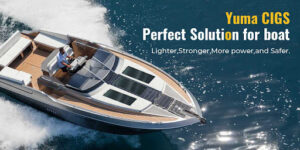In the quest for renewable energy solutions, solar power has taken center stage as one of the most efficient and accessible options. Among the advancements in this field, flexible solar panels have emerged as a transformative innovation, offering unparalleled versatility and portability. Designed to adapt to a variety of surfaces and environments, these panels provide an innovative alternative to traditional rigid solar panels, catering to unique energy needs.
Paired with reliable options like BougeRV solar panels, flexible panels are making renewable energy more accessible for off-grid living, outdoor adventures, and residential applications. Let’s explore their uses, importance, and the reasons why they are becoming a preferred choice for many.
What Are Flexible Solar Panels?
Flexible solar panels are lightweight photovoltaic sheets that can bend or curve without compromising their functionality. Unlike conventional rigid panels mounted on fixed frames, flexible solar panels are designed for dynamic applications, making them ideal for surfaces that are curved or irregular.
These panels are built using advanced materials such as thin-film solar cells or monocrystalline silicon, which allow for flexibility while maintaining efficiency in converting sunlight into electricity.
Why Flexible Solar Panels Are Transformative
The unique design of flexible solar panels makes them suitable for a wide range of applications. Here’s why they stand out:
- Adaptability
Flexible solar panels can conform to curved surfaces such as RV roofs, boats, and tents. Their adaptability expands the possibilities for solar energy use in unconventional settings. - Lightweight and Portable
Weighing significantly less than traditional panels, flexible solar panels are easier to transport and install, making them perfect for mobile setups. - Durability
Despite their lightweight construction, these panels are built to withstand harsh conditions, including exposure to wind, rain, and extreme temperatures. - Space Efficiency
With a slim profile, flexible solar panels are suitable for installations where space is limited. They can maximize energy production without taking up excessive room. - Cost-Effective for Niche Applications
Flexible panels offer a practical solution for situations where rigid panels may not be feasible, often eliminating the need for expensive mounting systems.
Applications of Flexible Solar Panels
Flexible solar panels are versatile and cater to a variety of energy needs:
- Recreational Vehicles (RVs)
These panels are commonly used to power RVs, providing electricity for appliances, lights, and charging devices during road trips. - Boats and Marine Use
On boats, flexible solar panels supply energy for navigation lights, communication systems, and other onboard equipment without adding significant weight. - Camping and Outdoor Adventures
Portable and lightweight, flexible solar panels are ideal for campers and hikers who need to charge devices or power small appliances in remote locations. - Residential Use
While less common for residential rooftops, flexible panels are an excellent choice for smaller projects like powering outdoor lighting or garden equipment. - Emergency Preparedness
Flexible solar panels serve as a reliable backup energy source during power outages or natural disasters, ensuring access to critical devices and lighting. - Commercial and Industrial Applications
Businesses with unconventional building designs can integrate flexible solar panels to meet specific energy needs without compromising aesthetics.
Benefits of Flexible Solar Panels
Adopting flexible solar panels offers numerous benefits:
- Renewable Energy Source
Solar energy is sustainable and environmentally friendly, reducing dependence on fossil fuels and lowering carbon emissions. - Energy Independence
With flexible solar panels, users can generate their own power, reducing reliance on traditional energy grids. - Cost Savings
Over time, the energy generated by solar panels offsets the initial investment, making them a cost-effective solution for energy needs. - Ease of Installation
Flexible solar panels require minimal setup and can be mounted using adhesives, straps, or lightweight brackets, saving time and effort. - Scalability
These panels can be used individually for small-scale projects or combined into larger systems to meet higher energy demands. - Enhanced Design Flexibility
Their ability to conform to various shapes and surfaces makes flexible solar panels suitable for creative installations.
BougeRV Solar Panels and Their Role in Renewable Energy
BougeRV solar panels are well-regarded for their durability, efficiency, and adaptability. Their range of flexible solar panels is designed to meet the unique challenges of mobile and off-grid energy needs.
BougeRV solar panels are built to withstand the rigors of outdoor environments, ensuring reliable energy production even in harsh conditions. Their compatibility with various applications, from camping gear to RV systems, highlights their versatility and reliability in renewable energy solutions.
Tips for Using Flexible Solar Panels Effectively
To maximize the efficiency and lifespan of your flexible solar panels, consider the following tips:
- Optimal Placement
Ensure your panels are placed in a location with maximum sunlight exposure throughout the day. - Regular Maintenance
Clean the panels regularly to remove dust, dirt, and debris that can block sunlight and reduce efficiency. - Pair with Energy Storage
Use batteries to store excess energy for use during cloudy days or nighttime. - Monitor Performance
Use a solar charge controller to optimize energy flow and protect your system from overcharging or power fluctuations. - Secure Installation
Use appropriate mounting methods to secure the panels, especially in mobile or windy environments.
Challenges and Limitations
While flexible solar panels offer numerous advantages, they also come with certain limitations:
- Lower Efficiency
Flexible panels generally have a slightly lower efficiency compared to rigid panels. However, advances in technology continue to narrow this gap. - Durability Concerns
Although durable, flexible panels may be more prone to wear and tear over time compared to rigid panels. - Limited Power Output
Flexible panels are better suited for smaller energy needs. For large-scale applications, multiple panels may be required.
Conclusion
Flexible solar panels represent a significant step forward in making renewable energy accessible and versatile. Their adaptability, lightweight design, and ease of use make them a practical choice for a wide range of applications, from powering RVs and boats to providing emergency backup energy.
Paired with trusted options like BougeRV solar panels, flexible panels offer durability and efficiency, ensuring consistent performance in diverse conditions. By investing in flexible solar panels, individuals and businesses can take a proactive step toward reducing their environmental impact and embracing sustainable energy solutions.
As the demand for renewable energy continues to grow, flexible solar panels will play an increasingly important role in creating innovative and practical solutions for energy independence. Whether for adventure, convenience, or environmental responsibility, these panels provide a pathway to a cleaner, greener future.

